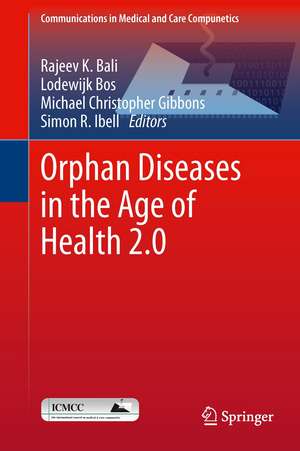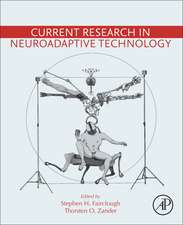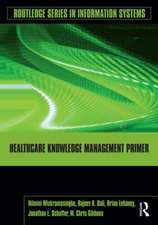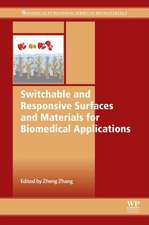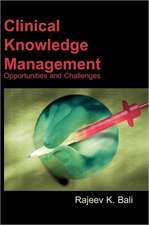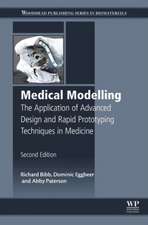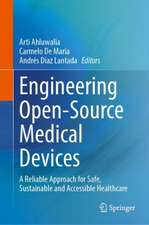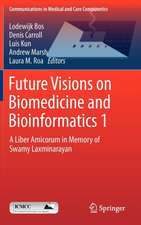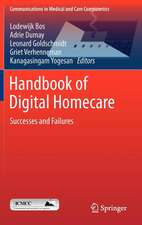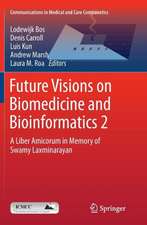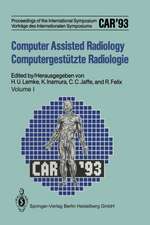Rare Diseases in the Age of Health 2.0: Communications in Medical and Care Compunetics, cartea 4
Editat de Rajeev K. Bali, Lodewijk Bos, Michael Christopher Gibbons, Simon Ibellen Limba Engleză Hardback – 31 oct 2013
| Toate formatele și edițiile | Preț | Express |
|---|---|---|
| Paperback (1) | 717.37 lei 6-8 săpt. | |
| Springer Berlin, Heidelberg – 23 aug 2016 | 717.37 lei 6-8 săpt. | |
| Hardback (1) | 724.50 lei 6-8 săpt. | |
| Springer Berlin, Heidelberg – 31 oct 2013 | 724.50 lei 6-8 săpt. |
Preț: 724.50 lei
Preț vechi: 762.64 lei
-5% Nou
Puncte Express: 1087
Preț estimativ în valută:
138.65€ • 144.22$ • 114.46£
138.65€ • 144.22$ • 114.46£
Carte tipărită la comandă
Livrare economică 12-26 aprilie
Preluare comenzi: 021 569.72.76
Specificații
ISBN-13: 9783642386428
ISBN-10: 3642386423
Pagini: 250
Ilustrații: XXXIII, 292 p. 14 illus.
Dimensiuni: 155 x 235 x 25 mm
Greutate: 0.64 kg
Ediția:2014
Editura: Springer Berlin, Heidelberg
Colecția Springer
Seria Communications in Medical and Care Compunetics
Locul publicării:Berlin, Heidelberg, Germany
ISBN-10: 3642386423
Pagini: 250
Ilustrații: XXXIII, 292 p. 14 illus.
Dimensiuni: 155 x 235 x 25 mm
Greutate: 0.64 kg
Ediția:2014
Editura: Springer Berlin, Heidelberg
Colecția Springer
Seria Communications in Medical and Care Compunetics
Locul publicării:Berlin, Heidelberg, Germany
Public țintă
ResearchCuprins
Part I: Rare and Orphan Diseases.- Why R&D into Rare Diseases Matter.- Vignette: Autoimmune Polyendocrine Syndrome Type I (APS 1).- Rare Diseases: How Genomics has Transformed Thinking, Diagnoses and Hope for Affected Families.- Vignette: A Giant of a Man: Simon Ibell (MPS II).- Innovative Funding Models for Rare Diseases.- Rare Diseases: The Medical and the Disability Perspectives in the Age of 2.0.- Vignette: Taking Control of Thalassemia.- Industry Perspectives on Orphan Drug Development.- Part II: Health 2.0.- Health 2.0: The Power of the Internet to Raise Awareness of Rare Diseases.- Vignette: Living with NOMID: Michael’s Story.- Health 2.0 and Information Literacy for Rare and Orphan Diseases.- Social Media and Engaging with Health Providers.- Vignette: Hope–Overcoming Fabry.- Empowering the Rare Disease Community: Thirty Years of Progress.- Part III: Patient Perspectives and Empowerment Issues.- The Role of Social Media in Healthcare: Experiences of a Crohn’s Disease Patient.- Vignette: The Blessings and Curse of Diagnosis: Myasthenia Gravis.- Noah’s Hope: Family Experiences of Batten Disease.- Using Technology to Share Information: Experiences of Oesophagus Atresia (OA) and Tracheaoesophageal Fistel (TOF).- Vignette: MPSIIIA (Sanfilippo).- The Empowered Patient in the Health System of the Future.- Vignette: The Journey of a Lifetime.- Personalized Medicine: A Cautionary Tale or Instructional Epic.- Part IV: Closing Gaps: Promising Research and Future Considerations.- Managing Communication for People with Amyotrophic Lateral Sclerosis: The Role of the Brain-Computer Interface.- Vignette: The Wilderness.- Opportunities and Challenges for Supporting People with Vascular Dementia Through the Use of Common Web 2.0 Services.- Vignette: Recessive Dystrophic Epidermolysis Bullosa (RDEB): Sibling Experiences.- Health Policies for Orphan Diseases: International Comparison of Regulatory, Reimbursement and Health Services Policies.- Vignette: Route125 (October 2009).- Rare Diseases Challenges and Opportunities.- Epilogue.
Notă biografică
Drs Lodewijk Bos is founder and president of the International Council on Medical and Care Compunetics (ICMCC), an international foundation operating as the knowledge centre for medical and care compunetics (COMPUting & Networking, its EThICs and Social/societal implications). He is E-i-C of the Springer Journal "Health and Technology" and series editor of "Communications in Medical and Care Compunetics". Dr Rajeev K Bali is a Reader in Healthcare Knowledge Management at Coventry University, UK. His main research interests lie in clinical and healthcare knowledge management. He is well published in peer reviewed journals and conferences and has been invited internationally to deliver presentations and speeches. Dr M Chris Gibbons MD is Associate Director of the Johns Hopkins Urban Health Institute and an Assistant Professor at the Johns Hopkins Schools of Medicine and Public Health. He is an urban health expert and informatician who works primarily in the area of consumer health informatics where he focuses on using health information and communications technologies to improve urban healthcare disparities. Simon Ibell is an advocate for human potential and a role model for persons with disabilities. Ibell’s condition, known as MPS II (mucopolysaccharidosis) or Hunter syndrome, is rare and is the result of an enzyme deficiency, which affects most of his major organs, his joints, and is both painful and debilitating. The iBellieve Foundation is Simon’s official organization that aims to conquer MPS II and related Lysosomal Storage Disorders.
Textul de pe ultima copertă
This text focuses on various factors associated with orphan diseases and the influence and role of health information technologies. Orphan diseases have not been adopted by the pharmaceutical industry because they provide little financial incentive to treat or prevent it. It is estimated that 6,000-7,000 orphan diseases exist today; as medical knowledge continues to expand, this number is likely to become much greater. The book highlights the opportunities and challenges in this increasingly important area. The book explores new avenues which are opened by information technologies and Health 2.0, and highlights also economic opportunities of orphan disease medicine.
The editors of this new book have international experience and competencies in the key areas of patient empowerment, healthcare and clinical knowledge management, healthcare inequalities and disparities, rare diseases and patient advocacy.
The editors of this new book have international experience and competencies in the key areas of patient empowerment, healthcare and clinical knowledge management, healthcare inequalities and disparities, rare diseases and patient advocacy.
Caracteristici
Focuses on various factors associated with orphan diseases Highlights the opportunities and challenges through information technologies and Health 2.0 Explores economic possibilities Written by an international authorship with experience and competencies in the key areas of patient empowerment, healthcare and clinical knowledge management, healthcare inequalities and disparities, rare diseases and patient advocacy Includes supplementary material: sn.pub/extras
